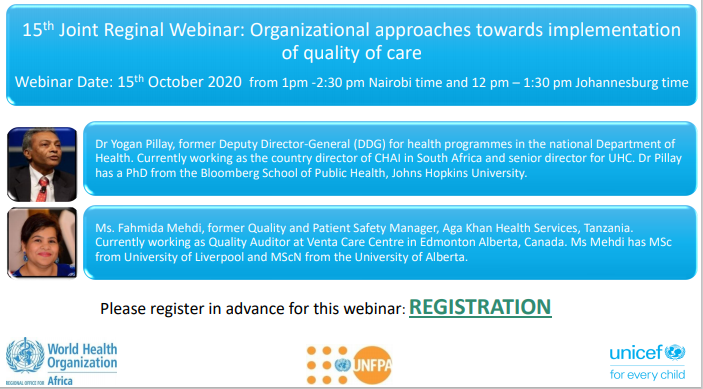As of March 2020, the outbreak of coronavirus disease (COVID-19) was declared a Public Health Emergency of International Concern, and the virus had spread to many countries and territories. While COVID-19 continues to spread, communities must take action to prevent further transmission, reduce the negative impacts of the outbreak and support control measures. Fragile and weak health systems in Sub-Saharan Africa are already overstretched and preliminary estimates and informal conversations with countries indicate adverse implications on the health of mothers and newborns. In as much as COVID-19 is the litmus paper to test the resiliency of the health systems in the region, it also provides an opportunity to enhance health service delivery capacity, and to create and maintain trust in public health systems.
In response to this, three UN agencies in Eastern and Southern Africa (WHO, UNFPA and UNICEF) jointly adapted the global COVID-19 guiding documents to develop a joint regional interim technical reference document for the continuity of essential MNH services within the COVID-19 context. Following the development of the interim reference guide, the need to strengthen capacity of country teams to apply the guidance in their settings and to continue the provision of MNH services was noted. In this regard, WHO, UNFPA and UNICEF offices are jointly conducting fortnightly webinars with the following objectives:
- To share the up to date information on maternal and newborn health in the context of COVID-19
- To provide a platform for countries for south-south learning
So, far we have conducted 15 webinars with over 1000 participants from various countries, representing diverse organizations and including managers, and frontline maternity & neonatal health care workers. The webinars are designed to provide practical implementable guidance that can be applied within maternity settings at all levels of health service delivery. In this regard, we have engaged global experts in various areas to provide the most up to date evidence-based information to guide delivery of safe and quality maternity services during the pandemic. This blog is about our 15 webinar which was about ‘’organizational approaches to institutionalize quality of care’ as we quality remains core of everything we do for maternal and newborn health services. Through this blog, I wanted to share few of my personal reflections:
Political and management leadership critical: It isn’t easy to institutionalize quality of care without the ownership rather sincere willingness both from the political and programme administration in the ministries of health. Additionally, ensuring quality is not just a responsibility of quality assurance departments; instead, all the departments of ministries of health need to bring the quality of care at the upfront of their work.
Invest in the measures of accountability at all levels. A famous phrase which says: “Quality of care is everyone’s responsibility” – and at the end of the day it becomes no one’s responsibility. Suppose we want to make quality everyone’s responsibility. In that case, we need to make it part of everyone’s job description, without making quality as part of the job description of every person who works in the health sector, it will remain no one’s responsibility.
We need to stop JUST relying on champions: many at times we rely on champions or a likeminded people who are eager to implement quality improvement in their health facilities. And once these champions leave their current positions, things go back to square one, and then we look for another champion to work on it – that’s how it continues but for how long? We can’t keep going on like this. We need to learn many things from private health institutions like Aga Khan Hospitals in Tanzania and Kenya.

Listen to your internal and external clients: When we talk about the quality of care, how frequently do we look at the views and of our internal clients? How many public hospitals in the developing world keep a record of staff satisfaction, burnout, and physical health issues including backaches, needle stick injuries, urinary tract infections and many others. Our external clients are people whom we serve, our mothers, children, adolescents and other age groups. We need to have mechanisms in place to listen to their voices – not a passive tool like complaint box, which is most of the time never opened. We need to put in place active mechanisms like mom connect in South Africa.

